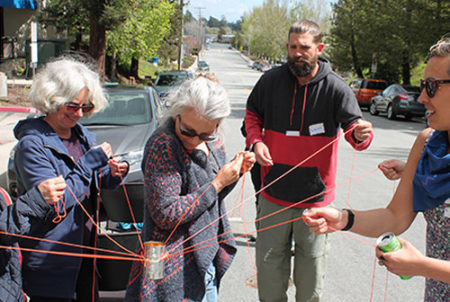Negotiations were friendly, in spite of the high stakes. These were teachers, after all. But instead of leading a classroom of students, these teachers were navigating an obstacle course representing a river system. Assuming the roles of eight different types of water users who must steward precious water through four simulated water management challenges, the teachers were all tethered to a single container of water suspended in mid-air. How much of the water might be left at the end of their journey? A cheer went out as a team successfully transferred their water to the “downstream” users.
 “This is perfect. I am going to go back and plan my whole year out! As a new teacher, this is exactly what I needed,” said a participating teacher from San Lorenzo Valley Unified School District.
“This is perfect. I am going to go back and plan my whole year out! As a new teacher, this is exactly what I needed,” said a participating teacher from San Lorenzo Valley Unified School District.
Teachers attending the training receive certification as Project WET (Water Education for Teachers) educators. The award-winning Project WET Curriculum is dedicated to 21st-century, cutting-edge water education. Correlated to Common Core Standards and with correlations to our new Science standards underway, the curriculum gives educators of children from kindergarten to twelfth grade the tools they need to integrate water education into every school subject. In addition to Project WET, participants gain access to California’s Education and the Environment Initiative (EEI) Curriculum, 85 units that teach Science, History-Social Science and English Language Arts using the local environment as an engaging lens for learning.
In the morning, participants jumped right into exploring the unique properties of water, making close observations, conducting experiments and collecting data on patterns they observed. Kids and adults like learning this way. The workshop was designed to give teachers an experience of what the new science standards look and feel like in practice. California’s new science standards, called the Next Generation Science Standards (CA NGSS) ask students to think and behave like scientists and engineers. When students understand how scientists and engineers do their work, and have opportunities to carry out investigations and design solutions, they become more engaged in learning and increase their comprehension.
This popular, annual workshop is revised every year to reflect the evolving needs of our local schools, with this year’s focus on adapting existing lessons to support NGSS and Environmental Literacy. The resource-rich program is made possible through a collaboration of local and state agencies brought together by the California Regional Environmental Education Community (CREEC). CREEC is a statewide network which provides educators with access to environmental education resources to enhance the environmental literacy of California students.
The Santa Cruz County Office of Education (SCCOE) is the hub for CREEC Region 5, serving: Santa Cruz, Monterey, San Benito and Santa Clara Counties. SCCOE hosts the Water Education Workshop each year. CREEC co-facilitates the day along with local experts from City of Watsonville’s award-winning Public Works Conservation Academy, Soquel Creek Water District, and CalRecycle’s Office of Education and the Environment. For more information on environmental education resources and environmental literacy in the region, contact Amity Sandage, CREEC Coordinator.
